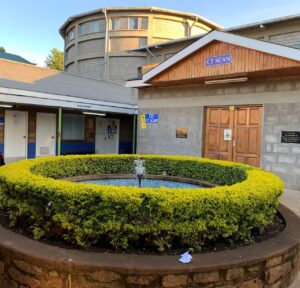Michael Hartung, MD established a remote Global Health Elective program in which radiology residents can have an international impact from the comfort of their home or hospital workstation.
Through his global health volunteer work, Dr. Hartung developed partnerships with the program’s two participating hospitals. Both the Tenwek Hospital in Bomet, Kenya and the Diospi-Suyana Hospital in Curahausi, Peru rely on US volunteers to read CT scans. With this program, the department’s residents can help with the workload while gaining invaluable global health experience.

Participating residents spend one to two weeks reading CT scans remotely from the hospitals. The CT scanners are a cornerstone of diagnosis and management for both centers. There are also opportunities for quality improvement projects, education, research, and supporting local tumor boards.
In addition to providing support to the hospitals, the program is a fantastic learning opportunity for residents. Both hospitals provide treatment to underserved populations, and patients often have uncommon or advanced-stage diseases that residents may not have previously encountered. This requires residents to consider the cases in a different light and evaluate management and treatment options that are often different than at UW. Residents may also need to conduct research to familiarize themselves with diseases that are uncommon in the US and seek second opinions for cases, pooling the subspeciality expertise that is offered throughout our department.
Current resident Brody Brisk, MD completed the remote Global Health Elective and shared his experience.
“The Global Health Remote Radiology elective is an incredible opportunity for residents and is truly an outstanding experience. The variety and amount of pathology I saw during the one week was hard to fathom. It was a great chance for me to work on my diagnostic skills, refine differentials, and provide excellent, meaningful care to an underserved population. I wouldn’t be surprised if I saw pathology during that week that I will never see again during my career. I would recommend this rotation to all residents.”
Additional information about the program can be found here.